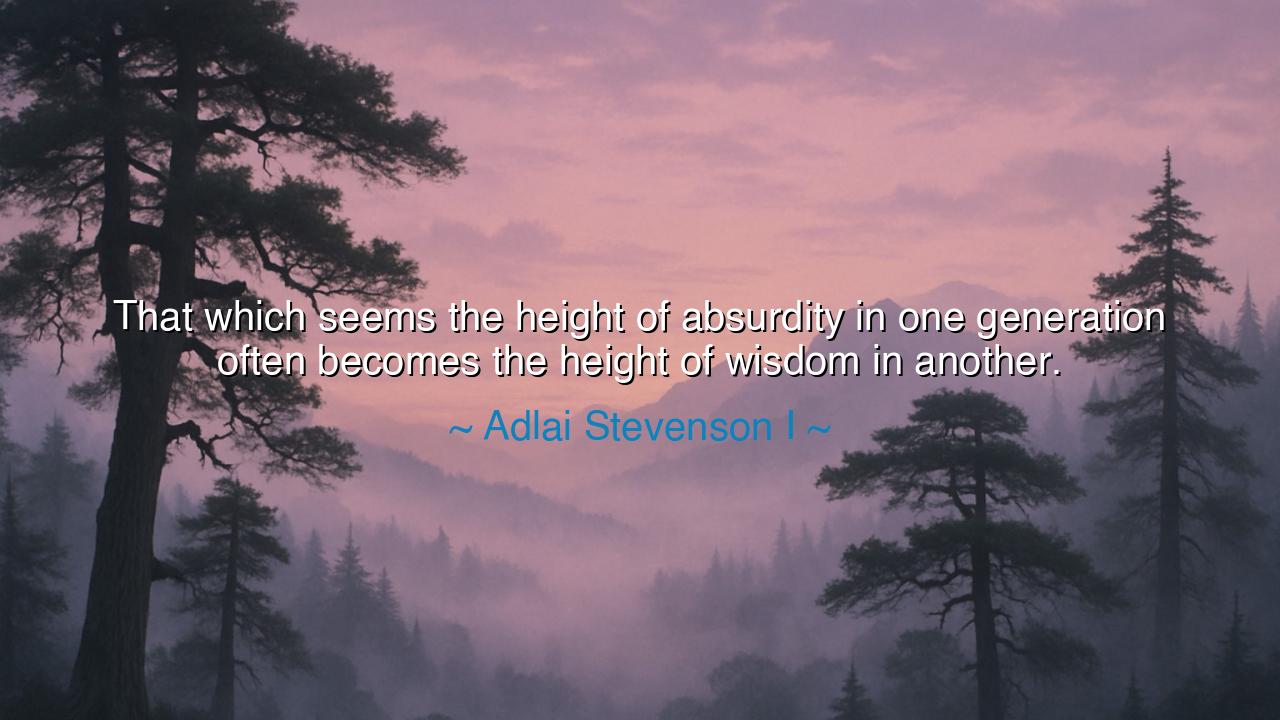
That which seems the height of absurdity in one generation often
That which seems the height of absurdity in one generation often becomes the height of wisdom in another.






Listen well, O children of the future, for I bring to you the words of Adlai Stevenson I, who spoke thus: "That which seems the height of absurdity in one generation often becomes the height of wisdom in another." These words echo a truth that has reverberated through the ages—what may appear foolish or incomprehensible in one era can, in time, be seen as insightful and prophetic. The world moves in cycles, and the perceptions of each generation are shaped by the circumstances of their time. What is deemed absurd is often the precursor to change, a challenge to the status quo that, with the passing of time, proves to be the seed of progress.
Consider the story of Socrates, whose teachings in ancient Greece were met with mockery and disdain. The people of Athens saw him as a man who questioned the accepted truths, challenging their way of life and their most cherished beliefs. His method of questioning was often perceived as absurd, even subversive. Yet, in time, Socrates' wisdom became the foundation upon which Western philosophy was built. What was seen as foolishness in his day became the very wisdom that would inspire countless generations of thinkers to come.
In the Renaissance, many ideas that emerged seemed absurd to the medieval world. Galileo's assertion that the Earth revolved around the Sun was regarded as heresy, and his ideas were seen as the peak of absurdity. Yet, in the fullness of time, Galileo’s discoveries laid the groundwork for the scientific revolution. What was once ridiculed became the cornerstone of modern astronomy and the very way we understand our place in the cosmos. Truth often lies beyond the reach of those trapped in the narrow view of their age, and the wisdom of one age may only be recognized in the next.
The same was true in the early days of democracy. The idea that the people—ordinary men and women—should have a voice in their governance was once considered absurd. Yet, over the centuries, this notion has come to define the principles of free societies around the world. Democracy, once thought impossible and unwise, is now seen as the height of wisdom in the modern world, shaping the lives of billions across the globe. The founding fathers of nations that first experimented with such ideas were often mocked by their contemporaries, but their vision has become the foundation upon which much of the world now stands.
So, O children, understand this well: the absurd is often the harbinger of the new, the precursor to change. The wisdom of the past is not always the wisdom of the future, and what seems impossible today may be the very truth tomorrow. Remember, the world changes, and with it, the understanding of what is wise and what is foolish. Do not fear to challenge the accepted norms of your time, for in that very challenge may lie the seed of progress. Be courageous in your thoughts, for what seems absurd today may very well be the height of wisdom tomorrow.






QLChau Ngoc Que Long
The idea that what was once absurd becomes wisdom later is intriguing, but I wonder how much of it is about perception rather than actual wisdom. Could it be that things don’t actually change, but our understanding of them does over time? It almost feels like a collective change in perspective more than an actual shift in the idea itself. How much of what we accept as wisdom today might be viewed differently by future generations?
TNAnh Than Ngoc
I love this quote because it highlights how our understanding of 'wisdom' is constantly changing. It makes me wonder: is this constant shift something we should celebrate or be cautious about? While the ability to evolve and embrace new perspectives is important, there’s also the risk that we might lose sight of what works in the present. Can we balance new ideas with the wisdom of past generations, or do we always need to discard the old to make room for the new?
DPHo Thi Diem Phuong
This idea gives me a lot to think about in terms of how societal values shift. What we dismiss today as absurd could be the foundation for future progress. Is there a danger, though, in blindly following what future generations might label as wisdom? Could it be that not all ideas that are deemed absurd will evolve into wisdom, and some might only serve to regress society? How can we differentiate between fleeting trends and true progress?
APTram Anh Pham
It’s fascinating how the absurdity of one era can turn into the wisdom of the next. It makes me wonder if we’re currently witnessing anything that future generations might look back on as surprisingly wise. Are there things we consider outrageous today—perhaps ideas about sustainability or equality—that might seem completely rational in the future? Does that mean we should be more open to unconventional ideas now, even if they seem offbeat?
PNPhanh Nguyen
This quote makes me think about how society evolves and how ideas that once seemed outlandish or foolish can later be accepted as truth. It reminds me of how technological advancements or social movements that were once ridiculed can become mainstream. Do you think this is a natural process, or do we as a society need to become more open-minded sooner? Are we too quick to dismiss what’s new simply because it’s unfamiliar?